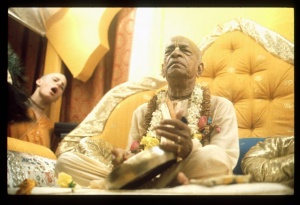SB 5.4.6: Difference between revisions
m (1 revision(s)) |
(Vanibot #0054 edit - transform synonyms into clickable links, which search similar occurrences) |
||
| (One intermediate revision by one other user not shown) | |||
| Line 1: | Line 1: | ||
{{info | {{info | ||
|speaker= | |speaker=Old Sages | ||
|listener= | |listener=Mahārāja Nābhi | ||
}} | }} | ||
[[Category:Srimad-Bhagavatam - Canto 05 Chapter 04|S06]] | |||
[[Category:Bhagavatam Verses Spoken by Old Sages - Vanisource|050406]] | |||
<div style="float:left">'''[[Srimad-Bhagavatam]] - [[SB 5|Fifth Canto]] - [[SB 5.4: The Characteristics of Rsabhadeva, the Supreme Personality of Godhead|Chapter 4: The Characteristics of Ṛṣabhadeva, the Supreme Personality of Godhead]]'''</div> | |||
<div style="float:right">[[File:Go-previous.png|link=SB 5.4.5]] '''[[SB 5.4.5]] - [[SB 5.4.7]]''' [[File:Go-next.png|link=SB 5.4.7]]</div> | |||
{{RandomImage}} | |||
==== TEXT 6 ==== | ==== TEXT 6 ==== | ||
<div class="verse"> | |||
<div | :yasya ha pāṇḍaveya ślokāv udāharanti—ko nu tat | ||
yasya ha pāṇḍaveya ślokāv | :karma rājarṣer nābher anv ācaret | ||
:pumān apatyatām agād yasya | |||
nābher anv ācaret pumān | :hariḥ śuddhena karmaṇā | ||
apatyatām agād yasya | |||
hariḥ śuddhena karmaṇā | |||
</div> | </div> | ||
| Line 18: | Line 22: | ||
==== SYNONYMS ==== | ==== SYNONYMS ==== | ||
<div class="synonyms"> | |||
<div | ''[//vanipedia.org/wiki/Special:VaniSearch?s=yasya&tab=syno_o&ds=1 yasya]'' — of whom; ''[//vanipedia.org/wiki/Special:VaniSearch?s=ha&tab=syno_o&ds=1 ha]'' — indeed; ''[//vanipedia.org/wiki/Special:VaniSearch?s=pāṇḍaveya&tab=syno_o&ds=1 pāṇḍaveya]'' — O Mahārāja Parīkṣit; ''[//vanipedia.org/wiki/Special:VaniSearch?s=ślokau&tab=syno_o&ds=1 ślokau]'' — two verses; ''[//vanipedia.org/wiki/Special:VaniSearch?s=udāharanti&tab=syno_o&ds=1 udāharanti]'' — recite; ''[//vanipedia.org/wiki/Special:VaniSearch?s=kaḥ&tab=syno_o&ds=1 kaḥ]'' — who; ''[//vanipedia.org/wiki/Special:VaniSearch?s=nu&tab=syno_o&ds=1 nu]'' — then; ''[//vanipedia.org/wiki/Special:VaniSearch?s=tat&tab=syno_o&ds=1 tat]'' — that; ''[//vanipedia.org/wiki/Special:VaniSearch?s=karma&tab=syno_o&ds=1 karma]'' — work; ''[//vanipedia.org/wiki/Special:VaniSearch?s=rāja&tab=syno_o&ds=1 rāja]-[//vanipedia.org/wiki/Special:VaniSearch?s=ṛṣeḥ&tab=syno_o&ds=1 ṛṣeḥ]'' — of the pious King; ''[//vanipedia.org/wiki/Special:VaniSearch?s=nābheḥ&tab=syno_o&ds=1 nābheḥ]'' — Nābhi; ''[//vanipedia.org/wiki/Special:VaniSearch?s=anu&tab=syno_o&ds=1 anu]'' — following; ''[//vanipedia.org/wiki/Special:VaniSearch?s=ācaret&tab=syno_o&ds=1 ācaret]'' — could execute; ''[//vanipedia.org/wiki/Special:VaniSearch?s=pumān&tab=syno_o&ds=1 pumān]'' — a man; ''[//vanipedia.org/wiki/Special:VaniSearch?s=apatyatām&tab=syno_o&ds=1 apatyatām]'' — sonhood; ''[//vanipedia.org/wiki/Special:VaniSearch?s=agāt&tab=syno_o&ds=1 agāt]'' — accepted; ''[//vanipedia.org/wiki/Special:VaniSearch?s=yasya&tab=syno_o&ds=1 yasya]'' — whose; ''[//vanipedia.org/wiki/Special:VaniSearch?s=hariḥ&tab=syno_o&ds=1 hariḥ]'' — the Supreme Personality of Godhead; ''[//vanipedia.org/wiki/Special:VaniSearch?s=śuddhena&tab=syno_o&ds=1 śuddhena]'' — pure, executed in devotional service; ''[//vanipedia.org/wiki/Special:VaniSearch?s=karmaṇā&tab=syno_o&ds=1 karmaṇā]'' — by activities. | ||
</div> | </div> | ||
| Line 26: | Line 29: | ||
==== TRANSLATION ==== | ==== TRANSLATION ==== | ||
<div class="translation"> | |||
<div | |||
O Mahārāja Parīkṣit, to glorify Mahārāja Nābhi, the old sages composed two verses. One of them is this: "Who can attain the perfection of Mahārāja Nābhi? Who can attain his activities? Because of his devotional service, the Supreme Personality of Godhead agreed to become his son." | O Mahārāja Parīkṣit, to glorify Mahārāja Nābhi, the old sages composed two verses. One of them is this: "Who can attain the perfection of Mahārāja Nābhi? Who can attain his activities? Because of his devotional service, the Supreme Personality of Godhead agreed to become his son." | ||
</div> | </div> | ||
| Line 33: | Line 35: | ||
==== PURPORT ==== | ==== PURPORT ==== | ||
<div class="purport"> | |||
The words ''śuddhena karmaṇā'' are significant in this verse. If work is not carried out in devotional service, it is contaminated by the modes of material nature. That is explained in ''Bhagavad-gītā: yajñārthāt karmaṇo 'nyatra loko 'yaṁ karma-bandhanaḥ'' ([[BG 3.9 (1972)|BG 3.9]])). Activities performed only for the satisfaction of the Supreme Lord are pure and are not contaminated by the modes of material nature. All other activities are contaminated by the modes of ignorance and passion, as well as goodness. All material activities meant for satisfying the senses are contaminated, and Mahārāja Nābhi did not perform anything contaminated. He simply executed his transcendental activities even when performing ''yajña''. Consequently he obtained the Supreme Lord as his son. | |||
</div> | |||
<div | <div style="float:right; clear:both;">[[File:Go-previous.png|link=SB 5.4.5]] '''[[SB 5.4.5]] - [[SB 5.4.7]]''' [[File:Go-next.png|link=SB 5.4.7]]</div> | ||
__NOTOC__ | |||
</div> | __NOEDITSECTION__ | ||
__NOTOC__ | |||
Latest revision as of 22:19, 18 February 2024

A.C. Bhaktivedanta Swami Prabhupada
TEXT 6
- yasya ha pāṇḍaveya ślokāv udāharanti—ko nu tat
- karma rājarṣer nābher anv ācaret
- pumān apatyatām agād yasya
- hariḥ śuddhena karmaṇā
SYNONYMS
yasya — of whom; ha — indeed; pāṇḍaveya — O Mahārāja Parīkṣit; ślokau — two verses; udāharanti — recite; kaḥ — who; nu — then; tat — that; karma — work; rāja-ṛṣeḥ — of the pious King; nābheḥ — Nābhi; anu — following; ācaret — could execute; pumān — a man; apatyatām — sonhood; agāt — accepted; yasya — whose; hariḥ — the Supreme Personality of Godhead; śuddhena — pure, executed in devotional service; karmaṇā — by activities.
TRANSLATION
O Mahārāja Parīkṣit, to glorify Mahārāja Nābhi, the old sages composed two verses. One of them is this: "Who can attain the perfection of Mahārāja Nābhi? Who can attain his activities? Because of his devotional service, the Supreme Personality of Godhead agreed to become his son."
PURPORT
The words śuddhena karmaṇā are significant in this verse. If work is not carried out in devotional service, it is contaminated by the modes of material nature. That is explained in Bhagavad-gītā: yajñārthāt karmaṇo 'nyatra loko 'yaṁ karma-bandhanaḥ (BG 3.9)). Activities performed only for the satisfaction of the Supreme Lord are pure and are not contaminated by the modes of material nature. All other activities are contaminated by the modes of ignorance and passion, as well as goodness. All material activities meant for satisfying the senses are contaminated, and Mahārāja Nābhi did not perform anything contaminated. He simply executed his transcendental activities even when performing yajña. Consequently he obtained the Supreme Lord as his son.